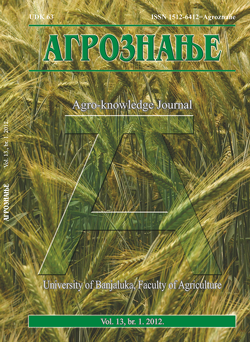Contents of nickel, zinc, copper and lead in agricultural soils of the plains in the northwestern part of the Republic of Srpska
DOI:
https://doi.org/10.7251/AGREN1201123MAbstract
This paper presents the results and methodology of investigation conducted on agricultural soils of the plains in the northwest Republic of Srpska, aiming to determine the extent of heavy metals contamination: nickel (Ni), zinc (Zn), copper (Cu) and lead (Pb). The investigation included 140 soil samples from 14 sites, where the soil samples were taken on 5 locations, from two layers (depths): arable (0-25 cm) and sub-arable (25-50 cm). The total contents of metals were determined by a method of atomic spectrophotometry after acid digestion (HNO3+H2O2). Organic matter content, CEC and pH were determined by standard agrochemical methods. The total contents of nickel in 78.5% of investigated soil samples were higher than the maximum allowed in the unpolluted soils (50 mg/kg). In 22.86% of the analysed samples, the content of zinc was higher than the maximum allowed in the unpolluted soils (100 mg/kg), while the content of copper and lead in the small number of samples was higher than the allowed maximum. Acidic soil reaction (pH<5.5) that increased bioavailability of metals was found in 38.6% of the samples investigated. A high degree of correlation was determined between the total content of certain metals (Cu and Ni, Cu and Zn). This suggests their common origin in the investigated area. The average contents of investigated metals in different layers (depths) were slightly different, having determined higher concentrations of Ni and Cu in the sub-arable layer that indicated the dominance of natural, geochemical sources of these metals in the soils. Territorial distribution of samples with high content of Ni and Zn corresponds to geological substrates which include minerals- natural carriers of Ni and Zn. This also indicates probable geochemical origin of these elements in the investigated soils. High contents of metals and acid soil reaction indicate that it is necessary to continue research in order to determine the risk of increased transfer of heavy metals from soil to the crops grown.Downloads
Published
2012-12-18
Issue
Section
Articles

